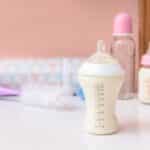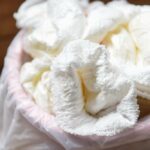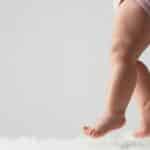It’s all fun and games until someone poops in the pool, right? That’s my motto when it comes to the kiddie pool out on the back porch, or even the bath.
Cleaning soggy poop out from water is just downright nasty. It seems that younger toddlers and babies have a natural reaction to the relaxing waters we prepare for them, to poop within five minutes of being in it.
Are there reasons behind this, or do they just do it spontaneously? What about older kids ages 5 to 7 years old? Do they ever have a bowel movement in the public pool or at a friend’s pool party?
In this article
- Do Newborns Poop In The Pool More Than Older Kids?
- What About Chlorine On My Newborn’s Skin?
- Toddlers Shouldn’t Poop In The Pool Often
- Kids Outgrow Pooping In The Pool
- What’s The Point of Cloth Diapers On Babies?
- How Long Should The Pool Be Closed After It Has Poop
- Methods To Sanitize Kiddie Pools Without An Irrigation System
- Can You Get Sick From Poop In The Pool?
- How Can I do My Part As A Parent To Keep Other Families Safe
- Sources
Do Newborns Poop In The Pool More Than Older Kids?
Let’s start with the young babies, the ones whose poop is still bright yellow. They can’t help but poop when they relax. Well, that’s just it for diapered babies. They can’t hold it in or communicate to parents when they are about to go.
Kiddie pools are specifically made for babies and toddlers to contain diaper contamination in that section.
While there are other reasons for kiddie pools like depth of the water and ease of taking infants in, every adult should know what they’re getting into in the kiddie pool.
View in gallery
Newborns poop on reflex, according to their bodies, not according to what’s appropriate. Chances are that babies will poop within the first 5 minutes of a bath or soak in the pool if they already are on the verge of going.
What About Chlorine On My Newborn’s Skin?
Small babies shouldn’t be exposed to chlorine for long periods of time. If you do happen to have a pool at home or want to soak with your baby in the bath, expect to clean up poop if your baby didn’t just go in their diaper.
Chlorine is great at disinfecting bacteria from fecal matter, which is why public pools need it to stay free of spreading harmful diseases.
Though, babies still need to be kept out of it. Small babies have a hard time regulating their body temperatures anyways, so parents need to test the temperature of the water before allowing them in.
Bath time is the best option for newborns and it’s wise for parents to plan their infants swim or bath sessions right after they poop.
Toddlers Shouldn’t Poop In The Pool Often
Once your child reaches their toddler years, they should be able to hold their bowel movements a little better.
View in gallery
Although, accidents do happen! If you find that your toddler is pooping in the pool constantly, then you should redirect activities until they grow a bit older and can control it themselves.
Kids Outgrow Pooping In The Pool
By the time your child is five, accidents should be rare, like ones involving fecal matter. They should be able to verbally express themselves and can hold it in until they reach a bathroom.
Most kids are decently potty trained by the age of five, so going to the bathroom in the pool shouldn’t be allowed. Make it clear, by asking them every 10 – 20 minutes while they’re swimming.
What’s The Point of Cloth Diapers On Babies?
When you see parents with cloth diapers on their babies, they’re most likely thinking about their babies skin having direct contact with chemicals in commercial diapers.
They seem to already know that swim diapers are filled with chemicals and once soiled, it will likely irritate their baby’s skin.
Rightfully so, cloth diapers are a much more eco-friendly and gentle option for swimming with a diapered baby. If you choose to use one at the pool, bring a few of them because to change your baby each time they take a break from swimming.
Cloth diapers can cause a ‘wet-rash’ more quickly than commercial diapers because they hold a lot of liquid in them once the baby is pulled out of the pool.
It seems that cloth diapers, especially those with a cover on them, hold in fecal matter better than commercial swim diapers overall. It’s because they are tightly fastened around babies thighs while disposable diapers are looser on the thighs.
How Long Should The Pool Be Closed After It Has Poop
Pools should be closed for 13 -26 hours after someone has pooped in it. During this time, chemicals should be introduced to kill any harmful bacteria.
What if it’s my personal pool?
If it happens to be your pool that a child has pooped in, raise the free chlorine levels to 20mg/L (ppm)(pH-7.2-7.5) for a maintenance timeframe of 13 hours.
You can also raise the free-chlorine levels to 10mg/L(ppm)(pH7.2-7.5) for a minimum of 26 hours.
Methods To Sanitize Kiddie Pools Without An Irrigation System
Kiddie pools that sit in the yard or on the back patio of duplexes and apartments can be sanitized with chlorine tablets. These are specifically formulated for pools with less than 200 gallons of water in them.
It’s convenient to be able to keep the small blow-up pool filled with water for weeks at a time. Without chlorine tablets, slime and bacteria will build up.
You can throw a chlorine tablet in once a week to sanitize your kiddie pool right at home, instead of draining after each use.
- BENEFITS: Sanitizes and protects your pool water so you can enjoy swimming in clean and clear water all season long
- USE: Place a tab in pool skimmer, floater, or feeder for simple, DIY pool care; 1 tablet treats 10,000 gallons of water for up to a week
- COMPATIBILITY: Vinyl-lined pools and saltwater systems
- FEATURES: Kills bacteria and algae; Chlorinates for up to 1 week; Clarifies water; Sun protected for longer chlorine life
Prices pulled from the Amazon Product Advertising API on:
Product prices and availability are accurate as of the date/time indicated and are subject to change. Any price and availability information displayed on [relevant Amazon Site(s), as applicable] at the time of purchase will apply to the purchase of this product.
Can You Get Sick From Poop In The Pool?
Bacteria from other people’s open wounds, sores, or insufficient hygiene that leaves fecal matter on the body can give children infections of the chest, ears, and eyes.
It’s best practice to wash with soap and fresh water after every swim or hot tub session.
How Can I do My Part As A Parent To Keep Other Families Safe
If you know that your child is sick or has had diarrhea, steer clear of the pool until they are a few days well.
Leftover bacteria from poop are still on the skin even when the bottom has been washed properly as well as the hands of kids who have an episode of diarrhea.
View in gallery
Teach your child to rinse the body thoroughly with soap before entering the pool or a hot tub. To ensure that illness is not spread, do your part to make the pool a better place.
Keep kids safe from feces in public pools
- Wash with soap and clean water directly after a swim session.
- After showering put back on clean dry clothing instead of swim trunks or bathing suits
- Place all swimwear and wet towels into a separate bag – handle it with care.
- Wear open-toed sandals that dry out quickly to the pool each time, to not soak tennis shoes where bacteria can remain after they have dried.
- Always wear sandals when walking along the poolside.
- Lay down a towel if your child is going to sit on public chairs on the poolside.
- If someone or your kid has a bowel movement in the pool, leave the pool immediately, and take a thorough shower.
Sources
Why is there so much poop in swimming pools?
The Truth about Swim Diapers and Exclusively Breastfed Babies






